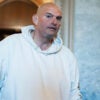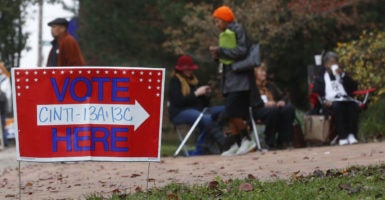The U.S. Supreme Court postponed a hearing originally scheduled for Wednesday on a potential landmark case regarding Ohio’s policy of purging its voter registration rolls of people no longer living in the state—and people no longer living, period.
“We’ve discovered noncitizens on the voter rolls … people who tried to vote multiple times,” @OhioSOSHusted says.
The ruling in the case could significantly affect efforts to curb voter fraud across the country.
Oral arguments before the high court in the case of Husted v. A. Philip Randolph Institute were scheduled for Wednesday, but the plaintiff’s counsel had to postpone till January for medical reasons.
An adverse ruling would have a national impact on election integrity, said Ohio Secretary of State Jon Husted.
“The consequences nationally are that it will make it harder for states to properly maintain their voter rolls,” Husted told The Daily Signal. “Since I became secretary of state, we’ve removed 600,000 deceased voters from the rolls, 1.7 million duplicate registrations, we’ve cross-checked with other states to make sure that people don’t vote more than once.
“So, everything we are trying to do to clean up the voter rolls would be harmed, based on a negative outcome of this case,” the Republican secretary of state said.
Nationally, voter registration rolls have been a problem, according to a 2012 Pew Research Center study that found about 1 in every 8 voter registrations was inaccurate, outdated, or duplicative; about 3 million people were registered in two or more states; and an estimated 1.8 million dead people remained on state voter rolls.
The chief plaintiff in the case is the A. Philip Randolph Institute, an organization for black trade unionists. It has been joined by a host of other liberal groups, such as Demos and the American Civil Liberties Union.
The plaintiffs contend the Ohio policy violates the 1993 federal National Voter Registration Act, better known as the “motor voter law.” Ohio argues the policy is fully compliant with the law, which also requires states to have up-to-date voting lists.
“Voting is the very foundation of our democracy, and Ohio’s voter-purge practice is a clear attempt to deny eligible people their right to have their voices heard,” Brenda Wright, vice president for policy and legal strategies at Demos, said in a statement.
The A. Philip Randolph Institute did not return phone and email inquiries from The Daily Signal on Wednesday.
The plaintiffs were victorious in the 6th U.S. Circuit Court of Appeals in September 2016. The appeals court ordered Ohio to count ballots cast in last year’s election by voters who had been removed since 2011.
The Trump administration’s Justice Department sided with Ohio in August in a brief before the Supreme Court, reversing the position of the Obama Justice Department, which had filed briefs on behalf of the plaintiffs.
Husted noted the plaintiffs are not from Ohio and are “suing us to try to use the federal government to write Ohio law.”
“We had a county in Ohio, Wood County, which is where Bowling Green State University is. When I became secretary of state, there were more registered voters in that county than there were people—[voting-age] adults—living in that county,” he said.
“The reason why is because you have college kids and other people who register, and when they graduate, they don’t remove their names from the rolls,” he continued. “So, this Supreme Court case would impact our ability to take their names off the rolls when they haven’t voted for a very, very long time and don’t respond to any of our attempts to contact them.
“So, we could end up having bloated rolls with thousands of people on there that we know aren’t eligible to vote.”
Ohio has seen its share of voter fraud convictions, documented in The Heritage Foundation’s voter fraud database. Russell Glassop cast an absentee ballot in 2012 in the name of his dead wife. Marguerite Kloose cast an absentee vote in the name of her dead sister. Melowese Richardson, a convicted former poll worker, voted twice in 2012 and other elections in the names of others, including her comatose sister.
“We do a top-to-bottom review after every general election. We’ve discovered noncitizens on the voter rolls, people who’ve tried to vote in more than one state, people who tried to vote multiple times,” Husted said. “So, we’ve been very successful in cleaning up the rolls and preventing this from happening.”
But the ACLU claims the removal of names risks the rights of eligible voters.
“This purge case spurred a large, diverse outpouring of individuals, organizations, and minority groups. They want to weigh in, to explain to the Supreme Court why they also condemn the purge,” Freda Levenson, legal director for the ACLU of Ohio, said in a statement.
President Donald Trump named a 12-member, bipartisan Presidential Advisory Commission on Election Integrity earlier this year, which includes former Ohio Secretary of State Ken Blackwell, a Republican.
Blackwell said decentralized elections are at stake in the court ruling.
“We have a decentralized system that means states have the right to determine how they manage their rolls,” he said. “That decentralization is actually a safeguard. If in fact we now start to have centralized policymaking, that is contrary to what has been the case throughout the history of the country.
“I think looking for ways to empower states to safeguard electoral integrity is the way we should be leaning, not in a way that empowers or gives more muscle to the federal government.”
Another member of the election integrity panel is Hans von Spakovsky, a senior legal fellow at The Heritage Foundation, who said a high court ruling against Ohio would be a “disaster” for the ability of any state to maintain accurate voting lists.
“The ulterior motive here is, the plaintiffs believe that everyone should be able to vote, even if they are not eligible, are noncitizens or felons,” von Spakovsky, also a former member of the Federal Election Commission, told The Daily Signal. “It is a pure grab for political power.”































